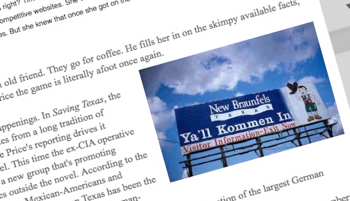
Beyond ‘It was a dark and stormy night….’
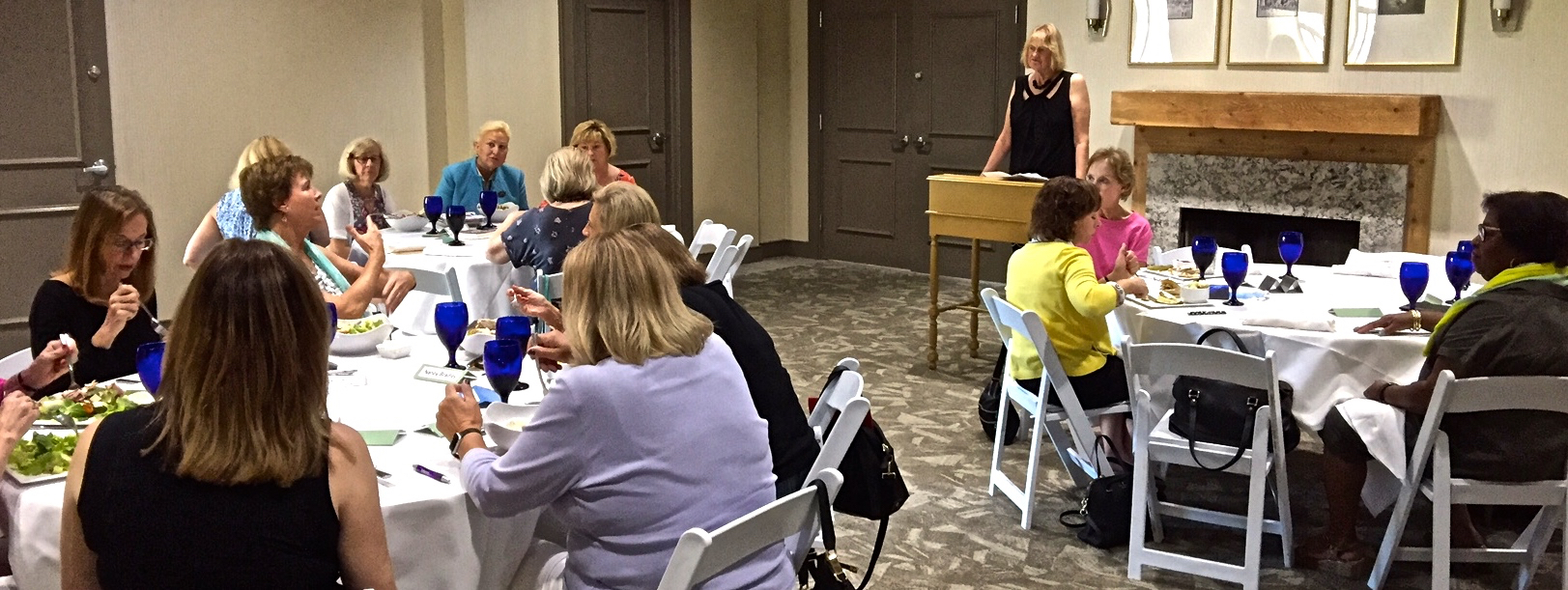
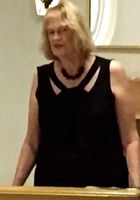
Sept. 27, 2017
I really enjoyed talking about Saving Texas and Winning Texas to gracious and literate members of the Carolina Women’s Club at TPC Piper Glen. I found it interesting that most of the questions centered on secession, a central theme in both novels.
We talked about the long-lasting secessionist movement in Texas, the nation’s largest with reportedly several hundred thousand adherents. We also analyzed other, lesser known movements in California, Colorado and overseas, particularly Catalonia, the area of Spain that currently is asserting its independence.
The discussion also centered on how I write (not often enough!) and prolific writers like Stephen King.
In King’s classic nonfiction book, On Writing, he relates that he spends his mornings writing and his afternoons on the business of being a writer. He’s a great role model for many of us who procrastinate!
Visiting Suffolk, Va. book club

Photo by Lee Poe April 18, 2017
Nancy Stancill was back at the Tuesday Afternoon Book Club in Suffolk, Va. to discuss books, and writing, and new projects.
Secession was just a plot line, until…
Aug. 13, 2016
This article was published Aug. 12 as an op-ed in the News & Observer under the headline “Texit? In US today, a surprising amount of secessionist sentiment.” It was also published Aug. 25 in the Houston Chronicle (paywall).
My obsession with secession began in 2009, when then-Texas Gov. Rick Perry suggested that if the federal government messed with his state, Texas could go its own way.
Typical Texas talk, I thought. Then the light bulb flashed on.
 I wanted to write a Texas novel about a reporter’s adventures in Houston, a bigger-than-life city where I’d worked for 15 years. But I needed a hook, something to knit it all together. Secession was the perfect theme.
I wanted to write a Texas novel about a reporter’s adventures in Houston, a bigger-than-life city where I’d worked for 15 years. But I needed a hook, something to knit it all together. Secession was the perfect theme.Seven years and two Texas suspense novels later, I’m amazed at the amount of secessionist activity threading itself across our country. Pro-secession groups are popping up and flourishing far beyond Texas, in states including California, Vermont, Colorado and Alaska.
This month, the South Carolina Secessionist Party was the latest to grab the headlines. Sparked by the removal of the Confederate battle flag from the statehouse grounds last year, the nascent party is raising funds to erect the flags on private lands across the state. The leader of the group, which has an active Facebook page, is Tyler Bessenger, a man in his 20s who lives in Charleston. I tried to reach him, but his listed phone had been disconnected.

Dr. Scott H. Huffmon I did reach Scott Huffmon, a political science professor at Winthrop (S.C.) College. He described the group as “very small but very loud” and organized primarily in response to the flag controversy. But he pointed out that secessionist activity in South Carolina is hardly new. The state was the first among 11 to secede from the union during the Civil War. And before the Civil War, the 13 original colonies unleashed the biggest secessionist movement of our history – the American Revolution. Historians have tracked at least a hundred secessionist groups over the years.
Still, the results of a national Reuters poll in 2014 were startling. The poll found that 23.9 percent – nearly 1 in 4 – Americans support their state breaking away from the United States. It found support for secession strongest among young people, rural people, people who identified themselves as conservatives and those living in the Southwest or Western states.
Huffmon said he hadn’t seen that data, but speculated that the polarization of our politics, especially during this election year, might fuel interest in secession. He said people who are disenchanted with politics or the general direction of the country tend to feel that things are better in their state, or in their region, than they are across the nation.
There are no estimates of how many secessionist groups are active. But several of the more active groups are in regions where residents believe their state governments are out of touch with their needs.
Seven counties in northern California have passed resolutions since 2013 to create the state of Jefferson, named for Thomas Jefferson, a champion of the West. Leaders of those counties also would like to include a few similar counties over the border into Oregon, though no Oregon counties have joined the quest. The mostly rural California counties, which are suffering high unemployment in agricultural and logging industries, contend that California state officials have done little to help their region.
Colorado has a similar situation with an active group that wants to create North Colorado from five counties along the state’s northeast border. Leaders in those oil and gas-producing counties have said they don’t agree with some environmental proposals from the Colorado legislature and don’t believe they get a fair share of services in their region, considering the revenues they produce.
Other large secessionist groups have longer-standing grievances, such as the Alaskan Independence Party. One of its governing beliefs is that the 1958 vote for statehood was illegal because voters should have gotten a range of options – including remaining a territory, becoming an independent country or becoming a U.S. commonwealth. Todd Palin, husband of former Republican vice presidential candidate Sarah Palin, formerly was a registered member of the party. The group tried unsuccessfully to get a statewide vote on secession in 2006.
The Texas Nationalist Movement, born in 2004, is the largest secessionist group in the country, claiming 200,000 members and becoming more visible in state affairs. It narrowly failed, at a recent Texas Republican Party convention, to get the Republican Party to vote on whether to call for Texas secession.
After Brexit in June, the movement started using the term Texit as shorthand for its ultimate goal of making Texas an independent republic. Texas secessionists also have history on their side, because after the state won its independence from Mexico (Remember the Alamo!), it was a republic for 10 years before it was admitted to the union. (Then it left for the duration of the Civil War.)
Some of these groups, Huffmon said, espouse unsavory philosophies, “a crossover between white supremacists and the militia movement.” But, ultimately, he said, it’s about how the groups spend their time. Talking about their beliefs over beers with their buddies is harmless enough, he said.
“But are they willing to commit violence?” he asked. “A lot of these homegrown terrorists, like the ones in Oklahoma City, would like to bring down the government.”
Nancy Stancill is a former Charlotte Observer reporter who lives in Charlotte.
A second novel that’s ‘wide open for a sequel’
Reviewer issues N.C. challenge for Book 3
Stancill writes about her focus on Houston in Winning Texas
Kirkus reviews Winning Texas
Virginian-Pilot reviews Winning Texas
N&O reviews Winning Texas, a ‘fast-paced thriller’
Reading and Q&A at Park Road Books Charlotte
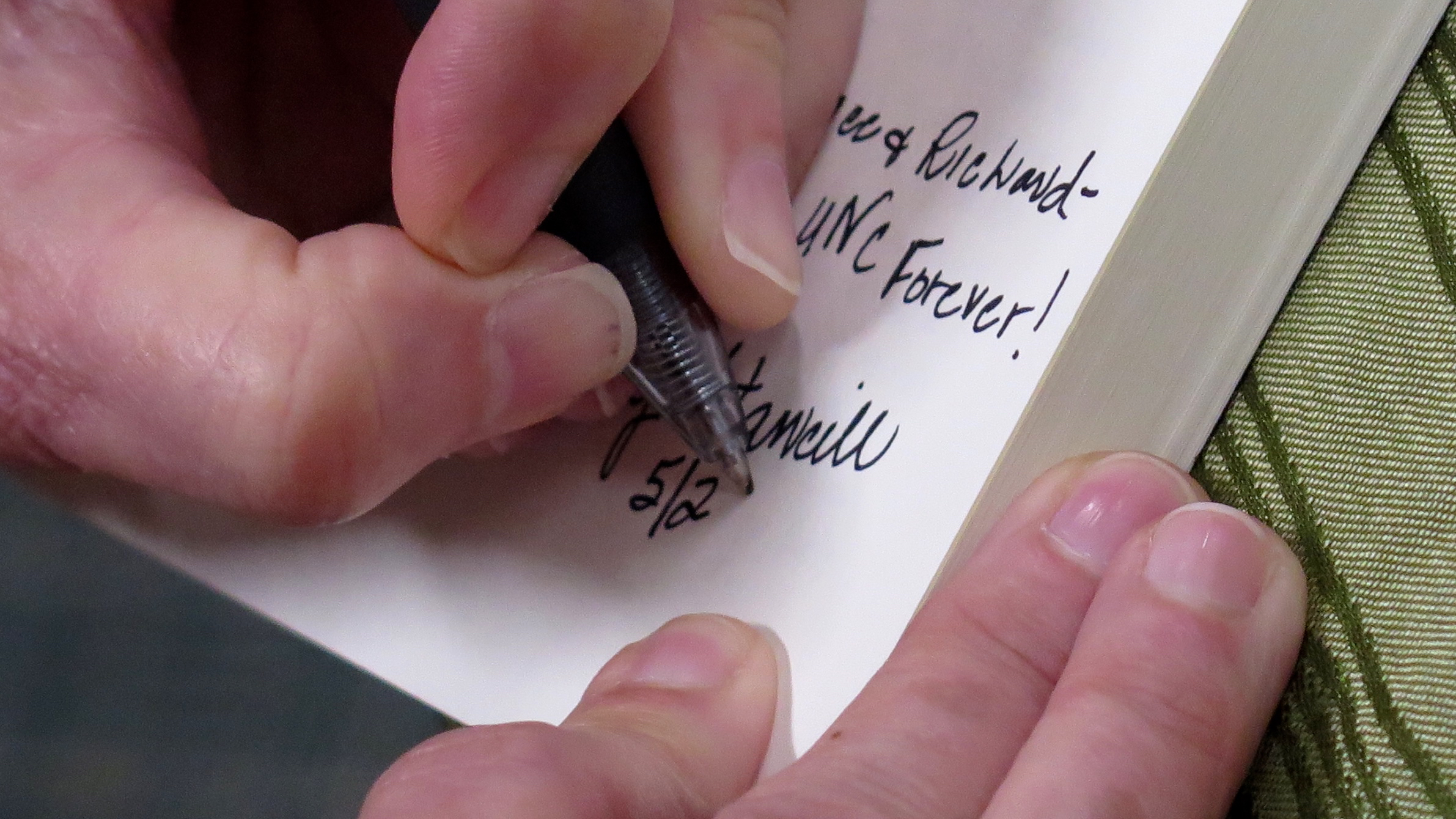
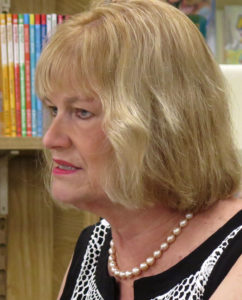
Nancy Stancill May 25, 2016
Nancy Stancill’s friends packed the back of Park Road Books tonight to hear the author read from her new suspense thriller, Winning Texas.
There was a gray hair or two in this audience of wellwishers – and also a real live teen whose name is a character in the book.
Stancill read a couple of excerpts, then answered questions. She talked about her love of Houston, and West Texas; her visit (with her husband) to a strip club – for research; and what she reads. Video excerpts from the readings and Q&A will be posted below as they are available.
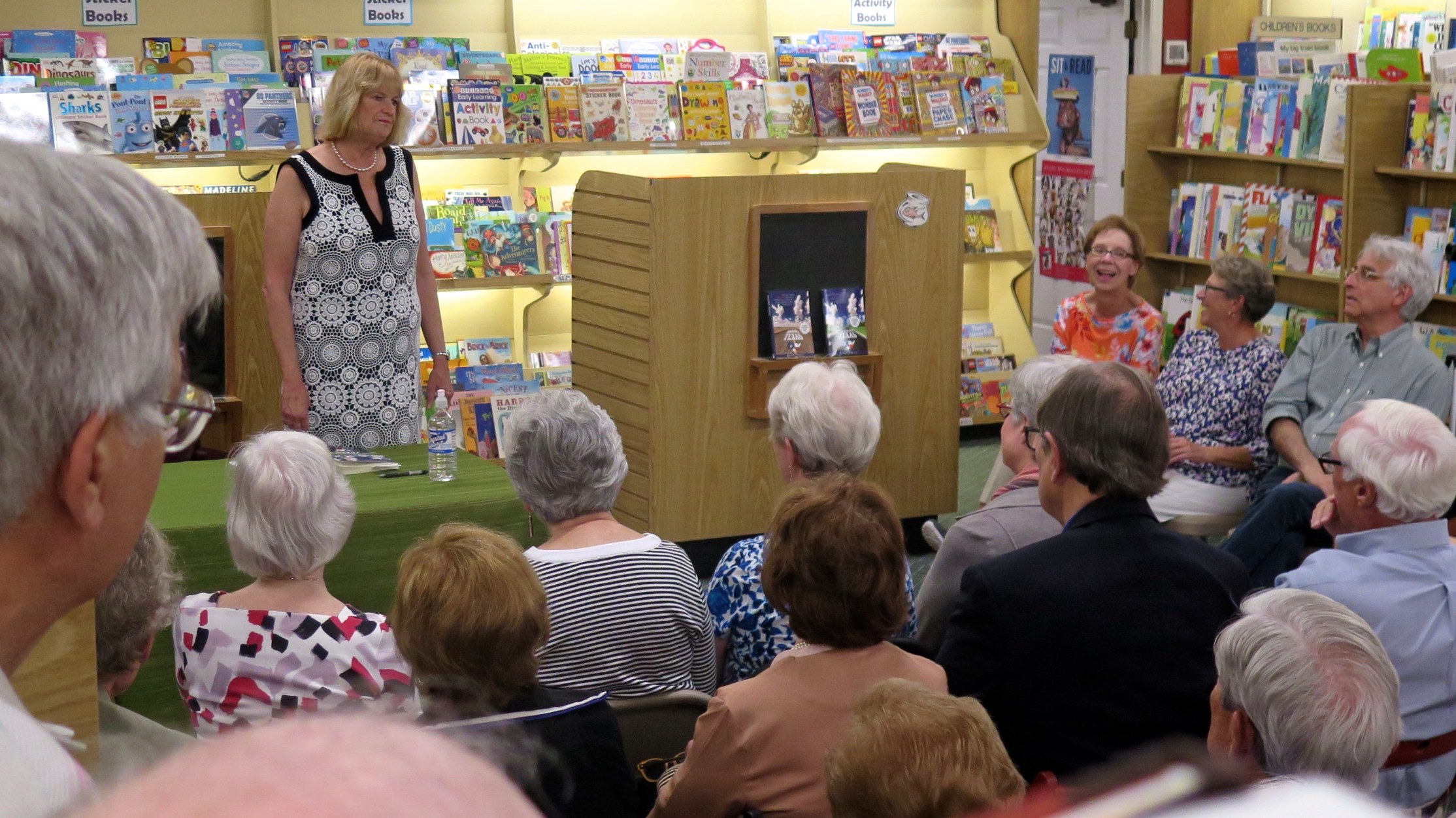

Virginia novelist Matthew Paust reviews Winning Texas
Dannye Romine Powell writes about Winning Texas
May 20, 2016
The Charlotte Observer’s Dannye Romine Powell wrote about Winning Texas today in her “Reading Matters” column. The piece is here (cached here).
Winning Texas available at Kindle store
May 10, 2016
The Kindle version of Winning Texas is available for pre-order at Amazon, with delivery May 19. Soon, it will be on Smashwords and Nook and over the next few weeks should show up at Sony, Apple, Kobo, Diesel, and more.
Winning Texas is published
May 5, 2016
 “Sex traffickers and guns-for-hire meet in a nefarious plot to see Texas secede and America shaken to its core. Witty, gritty and filled with brilliantly realized characters, this book is a pure delight for lovers of suspense as the ever-dogged Annie Price risks life and limb to uncover the truth.”
“Sex traffickers and guns-for-hire meet in a nefarious plot to see Texas secede and America shaken to its core. Witty, gritty and filled with brilliantly realized characters, this book is a pure delight for lovers of suspense as the ever-dogged Annie Price risks life and limb to uncover the truth.”– Tony D’Souza,
author of Mule“When a female body is found floating in the Houston Ship Channel, Annie Price, an investigative journalist for a struggling Houston newspaper, is propelled into a dangerous web of intrigue. She must solve a complex mystery that includes a corrupt strip club empire, a ruthless human trafficking scheme, and deadly competition between two separatist groups seeking to impose their twisted visions on the Lone Star State. As two murders hit close to home, Annie and a fellow reporter risk death to expose the hidden secrets of a Texas ranch.”
– Black Rose Writing
“Winning Texas is a moody thriller, an ode to people with outsized dreams and the ones they prey on; to those who populate the city by day, and those who rule the night. In the wake of L.A.-noir and Florida glare, Nancy Stancill gives us Bayou City grime. In her pages, Houston seduces and leaves us breathless, begging for more.”
– Stefan Kiesbye, author of The Staked Plains
Buy the book here.
You write alone, but it’s grand not to feel alone
May 5, 2016
Writing my first book was a lonely struggle, but I got lucky the second time around.
I started writing Winning Texas, my second suspense novel, as I entered the University of Tampa’s master’s program in creative writing in June 2013. When I graduated last summer, I ended up with a working draft of my second book – and so much more.
 For two years, I had the privilege and pleasure of being part of a creative community of writers who nurtured my work in a tender, caring way. My mentors were experienced novelists who helped me see the flaws in my writing without crushing my spirit. My fellow students read my chapters carefully, finding plenty to praise in the small critique groups that can quickly turn negative in academia. Or so I’ve heard. My groups never did. I hope that I was as gentle and helpful with my fellow students’ work as they were with my writing.
For two years, I had the privilege and pleasure of being part of a creative community of writers who nurtured my work in a tender, caring way. My mentors were experienced novelists who helped me see the flaws in my writing without crushing my spirit. My fellow students read my chapters carefully, finding plenty to praise in the small critique groups that can quickly turn negative in academia. Or so I’ve heard. My groups never did. I hope that I was as gentle and helpful with my fellow students’ work as they were with my writing.Today, as Winning Texas, my journalism-and-politics thriller is released by Black Rose Writing, I am grateful to the writers who helped me get there. It doesn’t quite take a village to produce a book, but a few dozen kindred spirits can make a novel so much better.
When I wrote Saving Texas, my first book, I was living in London as an expat while my husband worked for a Charlotte-based bank. Especially at first, when I knew no one, it could get horribly lonely. The weather was cold and dreary and I needed distraction and hope. Starting a novel based on a lifetime of reporter’s adventures was my answer. I’d sit at my kitchen table dressed in layers and write while the wind rattled the windows in our third-floor flat. Eventually I got the job done, but it was pretty much like solitary confinement with a thesaurus.
Grad school was gloriously different. I was still writing alone, but I knew that my fellow students were sweating through first drafts in steamy Miami, or snowy New York or cold Connecticut. Then we’d all come together and talk about our work in Tampa.
I will read from and sign copies of Winning Texas on Wednesday, May 25 at 7 p.m. at Park Road Books, 4139 Park Rd., in Charlotte.
Good news, readers!
May 4, 2016

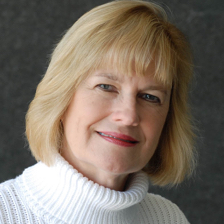
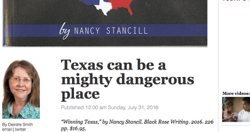 July 31, 2016
July 31, 2016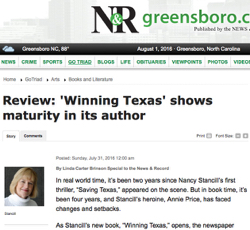 July 31, 2016
July 31, 2016 June 21, 2016
June 21, 2016 June 15, 2016
June 15, 2016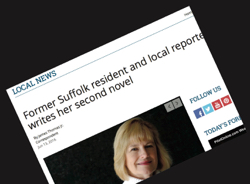 June 13, 2016
June 13, 2016 June 4, 2016
June 4, 2016